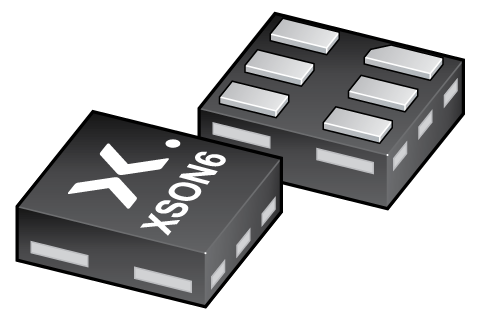可订购部件
| 型号 | 可订购的器件编号 | 订购代码(12NC) | 封装 | 从经销商处购买 |
|---|---|---|---|---|
| 74AUP1T34GN | 74AUP1T34GN,132 | 935291752132 | SOT1115 | 订单产品 |

Register once, drag and drop ECAD models into your CAD tool and speed up your design.
Click here for more informationLow-power dual supply translating buffer
The 74AUP1T34 is a single dual supply translating buffer. Input A is referenced to VCC(A) and output Y is referenced to VCC(Y). Schmitt-trigger action at all inputs makes the circuit tolerant of slower input rise and fall times. This device ensures very low static and dynamic power consumption across the entire VCC range from 1.1 V to 3.6 V. This device is fully specified for partial power down applications using IOFF. The IOFF circuitry disables the output, preventing the potentially damaging backflow current through the device when it is powered down.
Wide supply voltage range from 1.1 V to 3.6 V
CMOS low power dissipation
High noise immunity
Complies with JEDEC standards:
JESD8-7 (1.2 V to 1.95 V)
JESD8-5 (1.8 V to 2.7 V)
JESD8-B (2.7 V to 3.6 V)
Wide supply voltage range:
VCC(A): 1.1 V to 3.6 V
VCC(Y): 1.1 V to 3.6 V
Low static power consumption; ICC = 0.9 µA (maximum)
Each port operates over the full 1.1 V to 3.6 V power supply range
Latch-up performance exceeds 100 mA per JESD 78 Class II Level B
Overvoltage tolerant inputs to 3.6 V
Low noise overshoot and undershoot < 10 % of VCC
IOFF circuitry provides partial Power-down mode operation
ESD protection:
HBM: ANSI/ESDA/JEDEC JS-001 class 3A exceeds 5000 V
CDM: ANSI/ESDA/JEDEC JS-002 class C3 exceeds 1000 V
Multiple package options
Specified from -40 °C to +85 °C and -40 °C to +125 °C
| 型号 | VCC (V) | Logic switching levels | Output drive capability (mA) | Nr of bits | Power dissipation considerations | Tamb (°C) | Rth(j-a) (K/W) | Ψth(j-top) (K/W) | Rth(j-c) (K/W) | Package name |
|---|---|---|---|---|---|---|---|---|---|---|
| 74AUP1T34GN | n.a. | CMOS | ± 4 | 1 | ultra low | -40~125 | 367 | 28.9 | 227 | XSON6 |
| Model Name | 描述 |
|---|---|
|
|
| 型号 | 可订购的器件编号,(订购码(12NC)) | 状态 | 标示 | 封装 | 外形图 | 回流焊/波峰焊 | 包装 |
|---|---|---|---|---|---|---|---|
| 74AUP1T34GN | 74AUP1T34GN,132 (935291752132) |
Active | pQ |

XSON6 (SOT1115) |
SOT1115 | SOT1115_132 |
| 文件名称 | 标题 | 类型 | 日期 |
|---|---|---|---|
| 74AUP1T34 | Low-power dual supply translating buffer | Data sheet | 2024-09-23 |
| AN90063 | Questions about package outline drawings | Application note | 2025-10-22 |
| Nexperia_document_guide_Logic_translators | Nexperia Logic Translators | Brochure | 2021-04-12 |
| Nexperia_document_guide_MiniLogic_MicroPak_201808 | MicroPak leadless logic portfolio guide | Brochure | 2018-09-03 |
| SOT1115 | 3D model for products with SOT1115 package | Design support | 2023-02-02 |
| aup1t34 | 74AUP1T34 IBIS model | IBIS model | 2014-12-14 |
| Nexperia_document_leaflet_Logic_AUP_technology_portfolio_201904 | Nexperia_document_leaflet_Logic_AUP_technology_portfolio_201904 | Leaflet | 2019-04-12 |
| Nexperia_package_poster | Nexperia package poster | Leaflet | 2020-05-15 |
| XSON6_SOT1115_mk | plastic, extremely thin small outline package; 6 terminals; 0.55 mm pitch; 0.9 mm x 1 mm x 0.35 mm body | Marcom graphics | 2017-01-28 |
| REFLOW_BG-BD-1 | Reflow soldering profile | Other type | 2026-02-10 |
| SOT1115 | plastic, leadless extremely thin small outline package; 6 terminals; 0.3 mm pitch; 0.9 mm x 1 mm x 0.35 mm body | Package information | 2022-05-27 |
| SOT1115_132 | XSON6; Reel pack for SMD, 7''; Q3/T4 product orientation | Packing information | 2020-04-21 |
| 74AUP1T34GN_Nexperia_Product_Reliability | 74AUP1T34GN Nexperia Product Reliability | Quality document | 2025-03-20 |
| MAR_SOT1115 | MAR_SOT1115 Topmark | Top marking | 2013-06-03 |
The Nexperia Longevity Program is aimed to provide our customers information from time to time about the expected time that our products can be ordered. The NLP is reviewed and updated regularly by our Executive Management Team. View our longevity program here.
| Model Name | 描述 |
|---|---|
|
|
| 型号 | Orderable part number | Ordering code (12NC) | 状态 | 包装 | Packing Quantity | 在线购买 |
|---|---|---|---|---|---|---|
| 74AUP1T34GN | 74AUP1T34GN,132 | 935291752132 | Active | SOT1115_132 | 5,000 |
|
作为 Nexperia 的客户,您可以通过我们的销售机构订购样品。
如果您没有 Nexperia 的直接账户,我们的全球和地区分销商网络可为您提供 Nexperia 样品支持。查看官方经销商列表。
The interactive datasheets are based on the Nexperia MOSFET precision electrothermal models. With our interactive datasheets you can simply specify your own conditions interactively. Start by changing the values of the conditions. You can do this by using the sliders in the condition fields. By dragging the sliders you will see how the MOSFET will perform at the new conditions set.